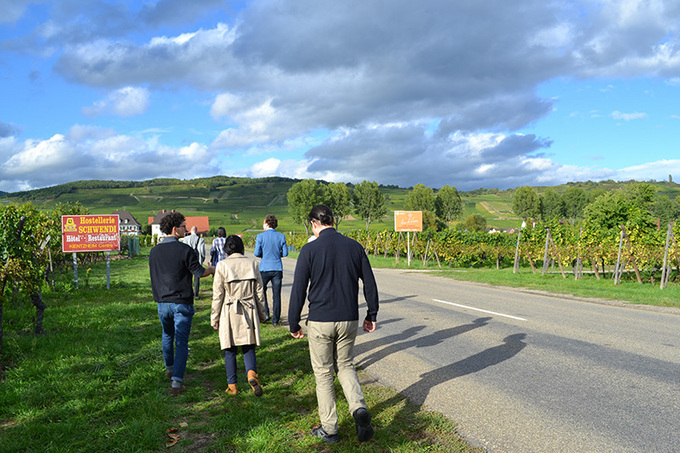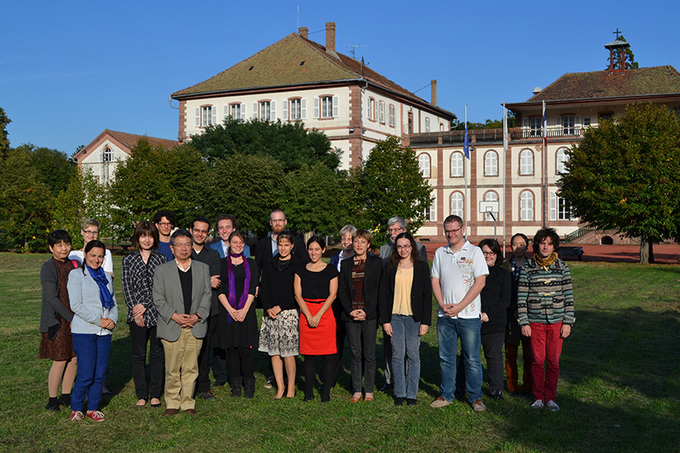My Thoughts after Attending the Intellectual Exchange Programme between Japan and Europe in Alsace - Japanese Study Seminar
Naomi Miyamoto (Professor, College of Letters, Ritsumeikan University)
On September 21 and 22, 2015, I attended a Japanese study seminar "Everyday Life and Culture" in Kientzheim with Professor Kenji Sato from the University of Tokyo. It was a seminar that the Japan Foundation organized at the Centre Européen d'Etudes Japonaises d'Alsace (CEEJA), which has close ties with the University of Strasbourg.

Rolling stretches of vineyards where Alsace wine is made
Although all nine of the participants were of different European nationalities, they were already having lively conversations at dinner the night before the seminar. I could not believe how fluently they all spoke Japanese! Not only that, they were using slang and mixing in casual expressions such as "...toka, maa sonna kanji" (or something like that...) and "nanteiuka..." (how should I put it...) ever so naturally. But that should be no surprise. All of them have lived in Japan for a few years, and are fully knowledgeable about the Japanese language and culture (all of them were punctual throughout the seminar - was that because they are researchers of Japanese culture?). Even so, they apparently still find it difficult to make presentations or write papers in academic Japanese. It must be several times easier for them to make presentations in English. In this sense, participating in this study seminar that was conducted in Japanese probably provided a valuable opportunity.
Each participant was given one hour at the seminar for their presentations, allowing in-depth discussions to take place. This stands in contrast to international symposiums, which proceed in an inflexible, structured way. The presentation themes were diverse, ranging from familiar topics such as eating, family, gender, everyday language, toilets, and pachinko, to the "everyday" as it relates to music, red-light districts, political philosophy, and literature. Many of the researchers had conducted fieldwork in Japan. For example, one researcher gave a presentation on the outcomes of fieldwork done on pachinko, carried out with a "professional player" - someone a Japanese researcher would find hard to contact. As far as the theme of toilets goes, Japanese people who are accustomed to their toilets may be unable to identify any problems surrounding them. It is these "outsiders' perspectives," which make you realize things you did not notice before, that are the key contributions of non-Japanese people to Japanese Studies. As a historical theme, the experience of "time" in the red-light district during the Edo Period was analyzed. Once again, I was amazed that the researchers could handle Japanese archival materials that not even most Japanese people can read.

Left and right: Intellectual Exchange Programme between Japan and Europe in Alsace - Japanese Study Seminar in progress
Meanwhile, all throughout the seminar, I had some qualms about whether the seminar would turn into a forum for confirming the peculiarity of Japan. Certainly, it is the differences between Japan and other cultures that inspire non-Japanese people to learn about Japanese culture. While it is interesting to analyze cultural aspects unique to Japan, we must be cautious in ensuring that "Japanese Studies" does not become only about these peculiarities, especially as there are many young researchers. In this connection, I would like to recall the following scene from the seminar. Based on the customs of their country, one participant commented on the distinct environment in which Japanese women find themselves. Then, another participant objected and provided information about customs of a third country. The discussion, which had originally been comparing two different customs, developed into one that was not simply about the peculiarity of Japan. I believe the diversity of this year's participants very much contributed to making this a meaningful seminar. I gather that if the perspectives of other Asian countries were added to the mix, the discussions in Japanese Studies could take on a different dimension and offer a whole new stimulus to European researchers.
Attending this seminar has made me rethink the significance of Japanese Studies. Although the participants of this seminar have an affinity for Japanese culture, it does not necessarily mean the analysis will be positive when Japanese culture becomes their research subject. That is to be expected. Their research may very well shed light on the problems in Japan, and this will in turn further deepen Japanese Studies. In a globalizing world, this is not the time for Japan to be inward looking and boasting about its greatness. The seminar's participants have a fondness for Japan, but at the same time, will not shy away from criticizing Japanese society. Political topics came up quite naturally in the conversations, and I hope Japanese students will adopt this custom as well, and I am not just talking about in research. If all we do is praise each other, international exchanges will never deepen.
For the participants, I imagine that being able to interact with young researchers of Japanese culture from other parts of Europe in and of itself was significant. As this seminar is somewhat like a training camp, I'm sure it provided participants a good opportunity to build close networks with each other. From what I gather, being able to share future concerns that are unique to young people, deeply encouraged the participants. Whether or not they can find jobs in academia is linked to whether Japanese Studies will remain attractive to the world in the future. For this reason, just as the participants present their research outcomes in Japanese and English, Japanese people must do much more in communicating their research outcomes in English (if I may add a personal note, I think it may be a good idea to have a large project that systematically translates the outstanding Japanese research reports into English). I will continue to look forward to the efforts by the University of Strasbourg and CEEJA, which will serve as key centers for this endeavor.

Commemorative photo of the participants of the Intellectual Exchange Programme between Japan and Europe in Alsace - Japanese Study Seminar
* Original text in Japanese, translated to English by the Japan Foundation
Naomi Miyamoto
Naomi Miyamoto is a professor at the College of Letters, Ritsumeikan University. She received a doctoral degree in sociology from the University of Tokyo Graduate School of Humanities and Sociology. She specializes in the sociology of 19th century European music culture and the fan culture of the Takarazuka Revue. Her publications include Kyoyo no Rekishi Shakaigaku: Doitsu Shimin Shakai to Ongaku [Historical Sociology of Bildung: German Civil Society and Music] (Iwanami Shoten 2006) and Takarazuka Fan no Shakaigaku [Sociology of Takarazuka Fans] (Seikyusha 2011).
Back Issues
- 2024.11. 1 Placed together, we …
- 2024.5.24 The 50th Japan Found…
- 2024.5.24 The 50th Japan Found…
- 2024.2.19 Movie Theaters aroun…
- 2024.2.19 Movie Theaters aroun…
- 2023.4.24 The 49th Japan Found…
- 2022.10.24 Inner Diversity <2> …
- 2022.10. 5 Living Together with…
- 2022.6.13 The 48th Japan Found…
- 2022.6. 3 The 48th Japan Found…

